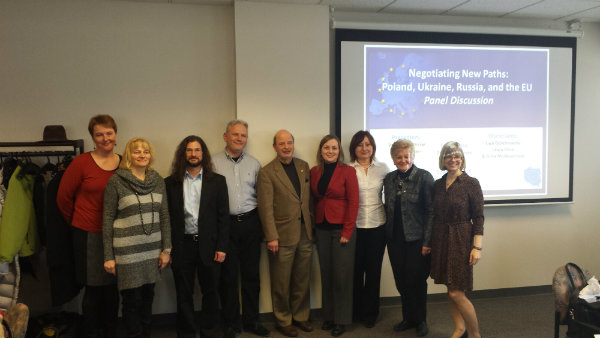Poland, Ukraine, Russia, the EU and the Russian-Ukrainian Conflict
On March 24, 2015, a group of distinguished panelists will meet at Wayne State University to discuss the Russian-Ukrainian conflict one year after events in the region escalated into a military conflict.
This is the second meeting of its kind: a year ago in March, a group of Wayne State University panelists, with a guest from Ukraine, discussed the relationship of Poland, Ukraine and Russia to the EU during a panel discussion entitled "Negotiating New Paths: Poland, Ukraine, Russia and the EU."
At the time Poland was preparing to celebrate the tenth anniversary of its accession to the EU, Ukraine's citizens were in the streets fighting to join the EU, while Russia, a major geopolitical player with no interest in joining the Union or witnessing its expansion, was already on the way to formally annexing Crimea.

Soon after, Russian-Ukrainian tensions escalated into a military conflict, and the situation in the region became a serious threat to European stability. Although the conflict is being covered by the American media, the gravity of the situation, its complexity, as well as the current and potential political, economic, and social implications for the region and the world are not being given adequate attention.
Hence the idea of this year's panel discussion, titled "One Year Later: Poland, Ukraine, Russia, the EU and the Russian-Ukrainian Conflict."
Why is it so important to explore these issues? In the words of one of the panelists, Professor Kevin Deegan-Krause: "What is happening in the region now will decide the future of a country the size of Texas, with a population bigger than California, located in one of Europe's most sensitive geographical areas. It is also likely to play an important role in what happens in Russia, a question that affects everybody on the planet."
The event, which is free and open to the public, will be held in the David Adamany Undergraduate Library Community Room from 1:30 to 3:00 p.m. on Tuesday, March 24.
More from the panelists:
Stephen Velychenko:
"What we are witnessing today is a war between two different nationalities, not two aggregates of individuals pursuing their respective self-interest. Kremlin anti-Ukrainian propaganda, though credible to the uninformed, is fallacious and liberals and leftists who believe and disseminate it are guilty of faulty logic, ignorance and/or double standards."
Aaron Retish:
"A year after annexing the Crimea, Russia is still actively working to direct the future of Ukraine by supporting rebels while trying to negotiate a system of governance and economic policy for its neighbor that better serves itself. Putin's stance against the West has made him more popular at home but harsh economic sanctions are helping to drive his country's economy into a deep recession that could hurt the regime in the long term. Clearly, Ukraine remains one of the most important regions in international affairs."
Brad Roth:
"Russia's armed takeover of Crimea and its direct and indirect forcible interventions in support of the "Peoples Republics" of Donetsk and Luhansk are unambiguous violations of international law. These crises remind us that international law, while often subject to competing interpretations, sometimes has clear and determinate applications and that even where non-compliant policies cannot be reversed in the near term, delegitimation of unlawful conduct serves an important purpose."
Alina Klin:
"The Russian-Ukrainian conflict came to most Europeans as a huge shock. It revealed the fragility of peace in Central Europe and affected neighboring countries, including Poland, in a profound way. Restoring peace in Ukraine is one of the biggest challenges Europe is facing right now."